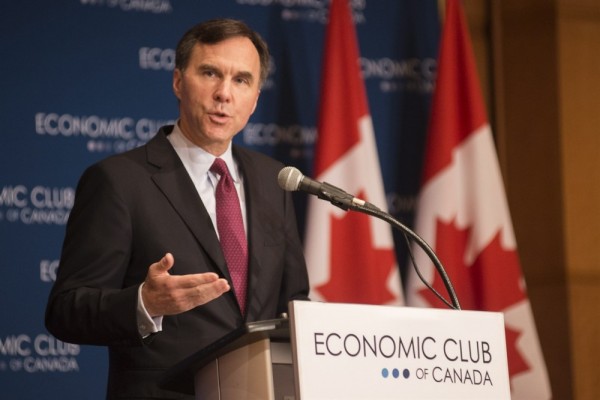‘Consultocracy’ and the not-so-new public management paradigm
Is a shadow public service threatening democracy?

The Deloitte office in Toronto, 181 Bay Street. Photo from Wikimedia Commons.
New Public Management (NPM) is a term first coined by Oxford University Professor Christopher Hood in a 1991 article entitled “A Public Management for All Seasons?” which described a then developing neoliberal paradigm in public administration focused upon smaller government, deregulation and profitability. It may be defined as a “series of beliefs and reforms that attempted to transform the public sector into an image of the private sector.”
In his article, Hood outlined seven key doctrinal components of NPM:
[H]ands-on professional management in the public sector; explicit standards and measures of performance; great emphasis on output controls; shift to disaggregation of units in the public sector; pivot to greater competition in the public sector; stress on private sector styles of management practice; and an emphasis on greater discipline and parsimony in resource use.
With the widespread proliferation of NPM policies across Western nations during the 1980s came massive deregulation, privatization of public assets, smaller government, tax reductions for the rich, and increased influence of business on government policy—implemented through political donations, lobbyists and management consultants.
Profitability became a foundational operating principle of governments, often subordinating public interest to the bottom line. Business concerns became the white elephant in any public policy debate room.
In this climate of government philosophy regenesis, a new model of public policy formulation emerged which relied heavily upon private sector expertise and opinion. By the 1990s, management and policy consultants became fundamental to government operation and policy making on a global scale.
A 2013 article by Simon Fraser University professors Michael Howlett and Andrea Migone highlighted a growing problem:
The use of external policy consultants in government has been an increasing focus of concern among governments in the United States, the United Kingdom, Canada and Australia, among others. Concern has arisen over the costs incurred by governments in this area and over the possible rise of a ‘consultocracy’ with the corresponding diminishment of democratic practices and public direction of policy and administrative development that could entail. While increasingly concerned about the use of consultants, governments and outside scholars alike have found it very difficult to ascertain… its impact, and those attempting to get a handle on the subject—whether from within government or outside it—continue to face several critical data and methodological challenges in researching this subject.
In a separate study, Howlett and Migone explore the public cost of management consultants using data from the Treasury Board of Canada Secretariat.
The figure shows rapid growth in expenditures in this category through to 2009–10 followed by a decline. However, reporting issues explain a large part of this apparent decline beginning with the 2010–11 fiscal year, as all of the data after 2011–12 solely reflect multi-year contracts extended into the future. Hence, in the key 2010–11 period the data show only a modest a decline since 2006–11.
According to the study, only two departments—Public Works and Government Services Canada (PWGSC) and Human Resources and Skills Development Canada (HRSDC)—account for about half of all management consulting contract expenditures. According to the Professional Insitute of the Public Service of Canada (PIPSC), between 2011 and 2018, the federal government spent over $11.9 billion on management consultants, temporary help contractors and IT consultants “to do the work that could have been done by Canada’s own public service professionals.”
While the prevailing narrative of NPM justifies outsourcing in terms of cost savings, in “The Changing Role of Consultants in Canadian Policy Analysis” SFU professors Anthony Perl and Donald J. White describe how the bottom-up downsizing of in-house government resources has actually resulted in increased transactional costs through the creation of an additional layer of supervision for external consultants:
An important implication of this research is that contracting out policy advice is not necessarily less expensive than directing resources to in-house policy capacity. Coupled with “an…over-generalised assumption that governments need now to look beyond the public service for both specialist expertise and advice on the most important issues,” there are indications that the Canadian government is devoting a growing share of its expenditure on goods and services to a more costly model of policy analysis.
The trends toward NPM has resulted in large taxpayer expenditures and increased costs, but what about its influence on policy development?
According to Howlett and Migone:
While it is not possible to conclude from expenditure data what qualitative impact this consulting activity has had on policy work and the nature of policy advice provided to Canadian governments, this pattern of expenditures is consistent with the idea … that policy and management consultants indeed comprise a large group of policy actors with continuing influence and impact on Canadian government policy making.
An invisible, for-profit public service?
Deloitte LLC is a major player in management consulting globally. Their Government and Public Services component describes a proactive approach to policy making that seems to go uncomfortably beyond the passive advice giving of traditional consulting.
According to its website, “Deloitte Government & Public Services is committed to improving public outcomes through a focus on people. At Deloitte we think about the complex issues facing the public sector and develop relevant, timely, and sustainable solutions for our clients.”
Traditionally, we think of democracy as government by the elected. ‘Consultocracy’ is technocratic government—or control—by an unaccountable, profit-driven elite. Within this framework, the line between elected officials and outside consultants has blurred over time in the area of policy making.
According to Denis Saint-Martin in The New Managerialism and the Policy Influence of Consultants in Government, the consultocracy has taken hold over the decades since the inception of NPM:
British and Canadian consultants have been involved … in the construction of the state’s management capacities. Through their participation in these institution‐building processes, they established networks of expertise with the state and acquired the experience of work in government. Over the years, this created opportunities for consultants to make their voices heard in the inner circles of decision‐making and made possible the exercise of influence that they are now said to have on policy.
Conflict of interest issues can also come into play. For example, a policy consultant might draft airline industry policy for Transport Canada, while simultaneously representing airline operators in other matters.
While PWGSC does include a standard conflict of interest clause in all procurement contracts, this can be difficult to police, especially with large multinational consultants such as Deloitte, KPMG, Ernst & Young (E&Y) and PricewaterhouseCoopers (PwC) who have thousands of clients globally.
On June 4, Public Works and Government Services Canada (PWGSC) awarded a $3 million services contract to Deloitte LLP of Ottawa for the provision of Task and Solutions Professional Services to Innovation, Science and Economic Development Canada (ISED), in connection with COVID-19 economic recovery planning.
The description of work includes, “The Contractor will also provide ongoing economic and financial analysis and advice with respect to the COVID-19 crisis, its impact on Canada’s economic sectors, and the restart of the Canadian economy in the National Capital Region (NCR) initiated through Task Authorizations.”
Canada’s economic future is now in the hands of a firm whose largest clients include Morgan Stanley, Berkshire Hathaway, The Blackstone Group, Microsoft, General Motors, Boeing, Monsanto and GlaxoSmithKline. The commercial interests of these large corporate clients may not necessarily align with public interests.
Capital Hill Group (CHG) is a Toronto-based government relations (lobbying) firm helmed by Conservative heavyweight David Angus (former Caucus Liaison to Prime Minister Brian Mulroney). For those tempted to downplay the influence of personal private-public-sector relationships, CHG is unequivocal:
We use our in-depth understanding of government processes, legislative procedure and political decision making to advise our clients on how to position and interact with Government stakeholders to achieve their objectives. The Government of Canada is one of the largest public buyers of goods and services in the country. It is estimated that the federal government spends approximately $16 billion on procurement each year … but the application process can be challenging. Our knowledge of the procurement system and close relationships with government officials at the federal, provincial, and municipal levels allow us to adeptly navigate these challenges.
Bill C-74, an omnibus bill signed in 2018 which contained the new Deferred Prosecution Agreement (DPA) law, was jokingly referred to on Parliament Hill as “The Lavalin Bill.” Major Liberal Party supporters SNC-Lavalin began lobbying government in May of 2015 following charges of corruption by the RCMP, registering seventy meetings with federal officials and parliamentarians over the next three years. Some have claimed that Lavalin’s view of DPAs appeared explicitly in the wording of a crucial section on Remediation Agreements.
While lobbyists are paid to influence public policy in their favour, policy consultants are paid by the government to help craft policy. In either case, public policy is impacted by the private sector.
In a report titled “The Real Cost of Outsourcing,” the PIPSC paints a grim picture:
Government outsourcing, especially outsourcing IT personnel, is costing Canadians billions of dollars each year. Government work, traditionally done by public servants, is increasingly being done by external consultants and contractors at a cost that should shock Canadians … years of unchecked spending on outsourcing has created a shadow public service of consultants operating alongside the government workforce.
A half-century on, it may be time to give NPM a rethink.
Ken Grafton is a writer living by the river in Aylmer, Québec, just downwind from Parliament Hill, with global executive-level experience in engineering and telecommunications. He is a freelance contributor to the Hamilton Spectator and the Chicago Tribune. His work has also been published in the Hill Times, National Observer, National Newswatch, Canadian Dimension, the Ottawa Citizen, National Post, the Welland Tribune, the Peterborough Examiner, the St. Catherines Standard, the Niagara Falls Review, the Waterloo Region Record, the Burlington Post, the Ontario Times, the Muskoka Times, Cambridge Times, the New Hamburg Independent, Hamilton News, Global News, Rabble, BuzzFlash, the Western Standard, Building Magazine, and The Low Down to Hull and Back.










